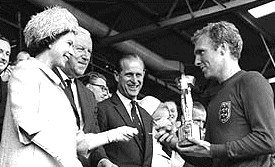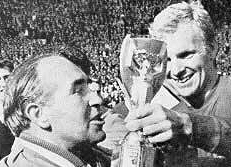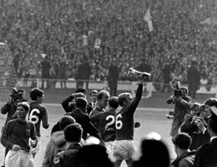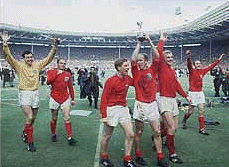
When
We Were Kings!
England's 1966 World Cup Victory
England's 1966 World Cup Victory

 |
When
We Were Kings!
England's 1966 World Cup Victory |
 |

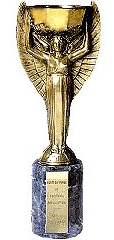 |
Alf
Ramsey had taken over the management of England following the resignation
of Walter Winterbottom and immediately failed to qualify for the 1964 European
Championships, prompting him to promise that England would win the next
World Cup.
Gordon Banks (Stoke City) replaced Ron Springett in goal and Jimmy Greaves (Tottenham Hotspur) and Bobby Charlton (Manchester United) spearheaded the attack. Ramsey's main problem remained the wing positions which were unresolved despite trialling several players. |
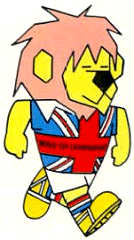 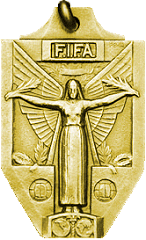 |
| England
were drawn with Mexico, France and Uruguay in Group A and commenced their
campaign with a 0-0 draw at Wembley against Uruguay. After this disappointing
start they finally found some of their goal touch with Roger Hunt and Bobby
Charlton hitting the net in a 2-0 win over Mexico. In the third qualifying game against France, Hunt was again the hero for England, scoring in each half to qualify for the quarter final knock-out stages, but at a cost. Star striker Jimmy Greaves, who had so far failed to open his goal account, suffered a badly-gashed leg and was not able to play in the quarter final where England were to face Argentina. He was replaced for this game by 25-year-old Geoff Hurst of West Ham United as Ramsey changed tactics and opted for a new 4-3-3 formation, eschewing the use of recognised wing players. |
| Versus
Uruguay: G.Banks, G.Cohen, R.Wilson, N.Stiles, J.Charlton,
R.Moore (Captain), A.Ball, J.Greaves, R.Charlton, R.Hunt, J.Connelly Versus Mexico: G.Banks, G.Cohen, R.Wilson, N.Stiles, J.Charlton, R.Moore (Captain), T.Paine, J.Greaves, R.Charlton, R.Hunt, M.Peters Versus France: G.Banks, G.Cohen, R.Wilson, N.Stiles, J.Charlton, R.Moore (Captain), I.Callaghan, J.Greaves, R.Charlton, R.Hunt, M.Peters Versus Argentina: G.Banks, G.Cohen, R.Wilson, N.Stiles, J.Charlton, R.Moore (Captain), A.Ball, G.Hurst, R.Charlton, R.Hunt, M.Peters Versus Portugal: G.Banks, G.Cohen, R.Wilson, N.Stiles, J.Charlton, R.Moore (Captain), A.Ball, G.Hurst, R.Charlton, R.Hunt, M.Peters Versus West Germany: G.Banks, G.Cohen, R.Wilson, N.Stiles, J.Charlton, R.Moore (Captain), A.Ball, G.Hurst, R.Charlton, R.Hunt, M.Peters |
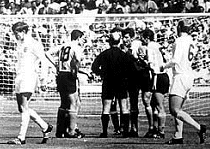 |
History
records that the confrontation with Argentina was a hard, rough, fiery affair
that finally came to a head when the Argentine captain Antonio Rattin was
sent off after a second bookable offence when he abused the referee while
disputing the booking of another of his players. Although down to ten men,
England continued to struggle to create scoring chances until the 79th minute,
when new boy Hurst sent a glancing header past goalkeeper Antonio Roma to
put the crowd into raptures and England into the semi-finals. Despite the victory, Ramsey was incensed at the physical tactics of the Argentines, later likening them to 'animals', and went out onto the pitch to physically stop his players swapping shirts with the beaten opposition.This was the first time in the history of the competition that England had progressed beyond the quarter-finals and they now faced Eusebio and the 'Eagles' of Portugal who had already disposed of the tournament favourites, Brazil. |
| This resulted in a Portuguese penalty which the legendary DaSilva Ferreira Eusebio, who had, up until then, been dominated by the attentions of Nobby Stiles, blasted in to record the first goal that England had conceded in the tournament and, more importantly, to keep the game alive for Portugal. England endured a seemingly endless final 10 minutes of pressure to run out 2-1 winners. Unforgettably, despite being the tournament's top scorer with 9 goals, Eusebio left the field shedding emotional tears… but we were in the final, which was due to be played at 'the home of football', Wembley Stadium, and our not inconsequential opponents were to be the mighty West Germany who had disposed of Russia's 'red army' team by a similar score after crushing Uruguay 4-0 in the quarters. |
 |
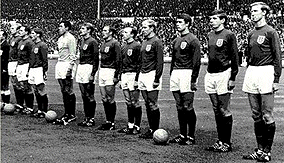 |
England
Gordon Banks George Cohen Ray Wilson Nobby Stiles Jack Charlton Bobby Moore Alan Ball Geoff Hurst Bobby Charlton Roger Hunt Martin Peters Manager: Alf Ramsey |
Referee
Gottfried Dienst (Switzerland) Linesmen Tofik Bakhramov (USSR) Dr Karol Galba (Czechoslovakia) Attendance 96,924 |
West
Germany
Hans Tilkowski Horst Hottges Karl-Heinz Schnellinger Franz Beckenbauer Willi Schulz Wolfgand Weber Helmuth Haller Wolfgang Overath Uwe Seeler Sigi Held Lothar Emmerich Manager: Helmut Schoen |
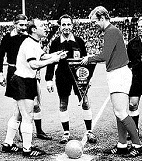 |
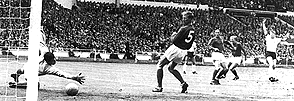 |
On
Saturday July 30th battle commenced in front of over 94,000 spectators
but it started badly for a nervous England when, after only 13 minutes,
the West Germans took the lead through Helmuth Haller. Ten minutes later
England won a free-kick outside the German area. Bobby Moore curved the
ball into the box for new-found hero and West Ham team-mate Geoff Hurst
to head into the net, leaving the game finely balanced at 1-1 as the half
time whistle was blown.
|
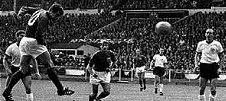 |
| The second half was equally contested but, despite several chances, the two teams remained deadlocked until the 78th minute when a shot from Geoff Hurst was blocked only for another of his West Ham team-mates, Martin Peters, to slot the ball home to give England what now looked like a winning goal with only 12 minutes to play. However, fate (and football) can often be cruel and, with only seconds left until the final whistle, referee Gottfried Dienst awarded the West Germans a controversial free-kick after a challenge by Jack Charlton. The ball came in and, in a frantic goal-mouth bundle, West Germany's Wolfgang Weber managed to stick out a leg and force the ball over the line just before the full-time whistle blew, sending the game into extra-time. |
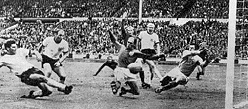 |
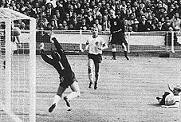 |
Alan Ball of Everton crossed to Geoff Hurst, who latched on to it and fired a shot at the German goal. With the goalkeeper beaten, it hammered against the underside the crossbar and bounced down, the spin on the ball bringing it back into the field of play. In that fraction of a second, Roger Hunt was convinced that it was a goal and wheeled away in celebration, ignoring the rebounding ball*. The referee was undecided as to whether it had crossed the line and, amid furious denials by the West germans, ran across to consult Azerbaijani linesman Tofik Bakhramov. After a brief discussion he made his decision - a goal was awarded and England had their noses back in front! |
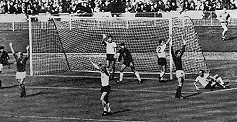 |
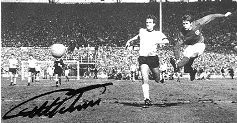 |
The German
response was ferocious but, as hard as they tried, they were unable to make
inroads into the stalwart England defence. The minutes ticked down and,
as the game entered its final minute, crowds started to pour down from the
stands, overflowing onto the edge of the pitch. The unfolding scenario was watched by BBC commentator Kenneth Wolstenholme, prompting him to start to make his now immortal observation 'Some people are on the pitch ..' English captain Bobby Moore fired a long ball up the pitch to an unmarked Geoff Hurst who collected the ball and headed towards the german goal… '… they think it's all over..' Hurst completely outpaced the final defender and rammed a swerving shot into the top corner of the German goal as the goalkeeper watched helplessly … '..it is now!' |
| The final
whistle sounded and England and Geoff Hurst, who had become the only, and
remains the only, player to score a hat trick in a world cup final, took
their place in the annals of football history amidst scenes of absolute
euphoria. Final score, England 4,West Germany 2! Subsequently voted 'Player
of the Tournament', proud captain Bobby Moore led his England team up the
Wembley steps to collect the Jules Rimet trophy, carefully wiping his hands
before accepting it from Queen Elizabeth II so as not to dirty her white
gloves! England manager Ramsey, so often at loggerheads with the FA for his tactics and team selections, was knighted in the New Year's honours list. Geoff Hurst left an indelible entry in the pages of football history and the man he replaced, Jimmy Greaves, probably one of the most skilled and prolific strikers the world of football has ever seen, had seen his last World Cup action. |
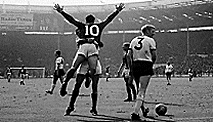 |
